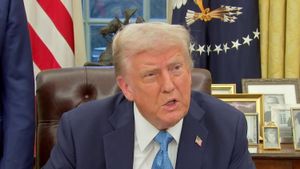US President Donald Trump has ignited controversy by imposing hefty tariffs on imports from Canada, Mexico, and China, actions aimed at curbing the flow of the deadly opioid fentanyl and addressing illegal immigration. Starting with 25% tariffs on goods from Canada and Mexico and 10% on goods from China, the move has prompted immediate retaliatory measures from the affected countries, stressing the potential for rising tensions and higher prices for American consumers.
Prime Minister Justin Trudeau of Canada and President Claudia Sheinbaum of Mexico announced counter-tariffs shortly after Trump’s declaration, with Trudeau stating Canada would impose 25% tariffs on CAD 155 billion worth of US goods, alongside specific duties on energy imports and agricultural products. “It will have real consequences for you, the American people,” Trudeau warned, emphasizing the pain these tariffs would potentially inflict on American households as prices of groceries and other goods are set to rise.
Trudeau’s passionate speech served as a reminder to American consumers about the long-standing ties between the nations. He recalled how Canadian troops have supported Americans during crises and urged Canadians to choose local products over American ones. “The actions taken by the White House split us apart instead of bringing us together,” he articulated, channeling the sentiments of many Canadians feeling betrayed by their southern neighbor.
Meanwhile, Mexico responded with similar determination. Sheinbaum ordered her economic minister to implement necessary measures to safeguard Mexican interests. “We categorically reject the White House's slander,” she stated, addressing allegations of criminal alliances and emphasizing the need for the US to focus on its own drug issues rather than deflecting them onto neighboring countries.
Trump's administration framed the tariffs as part of efforts to combat the fentanyl crisis impacting Americans, drawing direct lines between illegal drugs and trade policies. Though the motives may resonate with some constituents, numerous economists have voiced skepticism about the efficacy of tariffs to achieve such aims. A growing concern is the economic backlash; the tariffs could lead to diminished growth and exacerbate inflation for U.S. consumers, who are already grappling with rising living costs.
A study from the Budget Lab at Yale University indicated the average American household could lose approximately USD 1,170 as tariffs inflate prices. Senior adviser William Reinsch expressed confusion over the strategy, saying, “It doesn’t make much economic sense.” He highlighted the historical precedent of maintaining low tariffs on raw materials to support competition among manufacturers, questioning the logic behind stifling economies of scale with new tariffs.
Despite widespread dissent both domestically and internationally, the White House remains unyielding. Trump characterized the tariffs as leveraging US economic power and appears prepared to escalate duties if other nations retaliate. “You see the power of the tariff,” he stated, touting it as a way to regain competitive advantage.
China, not to be overlooked, vowed to challenge the tariffs through the World Trade Organization, emphasizing the notion of free trade and declaring, “The drug crisis is America’s problem.” Their stance reflects the complexity of global trade dynamics and the gravity of impacting long-treasured trade relationships.
This chapter of economic policy brings to light broader questions about effective governance and trade philosophy. Some outside observers warn the tariffs could initiate far-reaching repercussions, posing threats not only to consumer prices but also to international relations. Markets have reacted accordingly; the S&P 500 fell sharply following the announcement, reflecting anxiety over potential economic instability.
Experts anticipate the tariffs could herald an extended period of increased tension among trading nations. President Trump has indicated this may just be the beginning, with potential additional tariffs on various imported goods, including oil and electronics, looming on the horizon.
Trudeau and Sheinbaum both signalled readiness to counter any overreach. Trudeau plans to implement CAD 1.3 billion toward border security improvements to soothe U.S. concerns, stating their upcoming plans will stand firm against any attempts to segregate and undermine their trading ties.
The long-term impacts of Trump’s economic actions remain uncertain. Possible backlash from American consumers could reshape electoral landscapes if voters begin to feel the financial squeeze of these policies. The fluctuated support for tariffs as noted by AP VoteCast during previous elections only adds complexity to calculating the sustainability of these moves.
Indeed, the proposed trade measures are forceful attempts to reshape both domestic and international landscapes, captivating both supporters and detractors alike. While Trump claims guidance from America’s past successes with tariff policies, many critics assert the outcome may only yield adverse effects this time around.
Reactions continue to pour from both economic leaders and everyday citizens, the latter remaining vigilant as they brace for changes effecting their wallets. Negotiations, amendments, and future political maneuverings over tariffs promise to be pivotal discussions as stakeholders aim to navigate this uncertain climate of trade.
With considerable uncertainty on the horizon, the potential for escalation looms as relations between the U.S. and its trading partners hang in the balance, continuing to impact economies worldwide.



